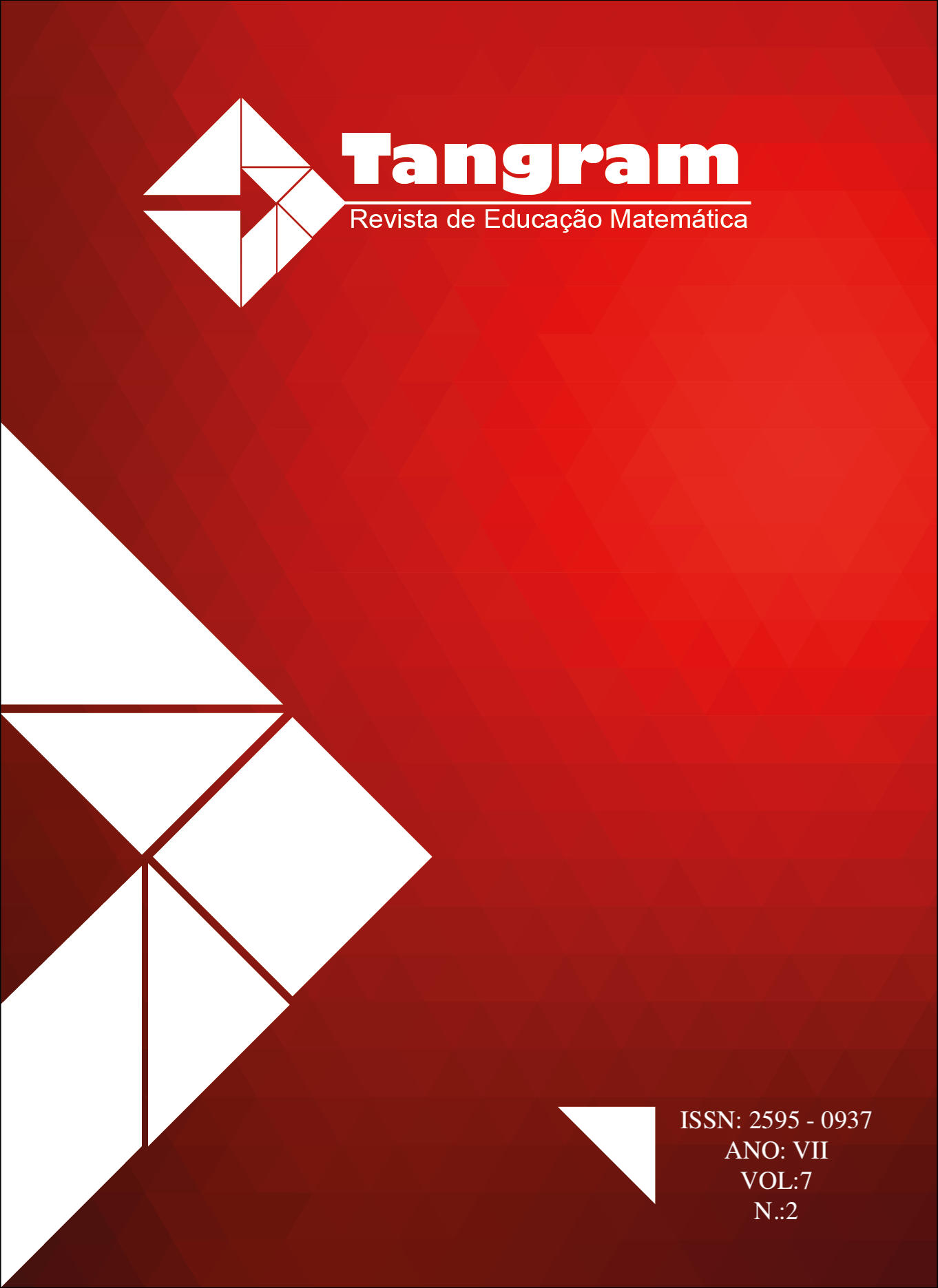Mapping of Brazilian researches that investigate the use of the Active Group Work Methodology to approach mathematical concepts.
DOI:
https://doi.org/10.30612/tangram.v7i2.17623Keywords:
Group work, Mathematics Education, Active MethodologyAbstract
A mapping of Brazilian researches that investigate the use of the Active Group Work Methodology in Mathematics Education is presented. The mapping was carried out from the survey of dissertations and thesis that addressed the subject. In order to synthesize and analyze existing studies on the subject, inclusion and exclusion criteria were applied to select relevant studies, such as the presence of specific keywords and the focus on mathematics education using the active methodology "Group Work". After selecting the studies, detailed readings and analyzes of the selected articles were carried out, identifying research objectives, methodologies, results and conclusions. The analysis showed that, although the research addresses group work, they do not indicate how, in fact, it can be developed in the school context. In addition, it was evidenced that, many times, the terms “cooperative learning”, “team-based learning” and “group work” are used as synonyms, but, in fact, they are not.
Downloads
References
Aquino, A. C (2013). Introduzindo o Pensamento Combinatório nos Anos Finais do Ensino Fundamental: uma proposta de ensino.
Dissertação (Mestrado Profissional em Matemática Nacional) - PROFMAT, Universidade Federal do Vale do São Francisco, Juazeiro, BA.
Bacich, L; Moran. (2018) J. Metodologias Ativas para uma educação inovadora: uma abordagem teórico-prática. 1 ed. Porto Alegre: Penso Editora Ltda.
Berbel, N. A. N. (1996). Metodologia da problematização: fundamentos e aplicações. Londrina: UEL.
Bollela V. R.; Senger M. H.; Tourinho, F. S. V.; Amaral E. (2014). Aprendizagem baseada em equipes: Da teoria à prática. Revista Medicina, Ribeirão Preto, v. 47, n. 3, p. 293-300, 2014. Disponível em: https://www.revistas.usp.br/rmrp/article/view/86618. Acesso em: 31 mar. 2024.
Brasil (1997). Parâmetros Curriculares Nacionais: Apresentação dos temas transversais, ética. Secretaria da Educação Fundamental. –Brasília: MEC/SEF, 1997, 147 p. V. 7
Cohen, E. G.; Lotan, R. A (2017). Planejando o trabalho em grupo. 3. ed. São Paulo: Penso, 2017.
Fiorentini, D.; Passo, C. L.; Lima. R. C. (2016) O professor que ensina matemática como campo de estudo: concepção do projeto de pesquisa. In: Fiorentino, D.; Passos, C. L. B.; Lima R. C. R. (Org.). Mapeamento da pesquisa acadêmica brasileira sobre o professor que ensina matemática: período 2001-2012. São Paulo: FE/UNICAMP, 2016. p.17- 41
Fiorentini. (2004) D. Histórias de aulas de Matemática: compartilhando saberes profissionais. Campinas: Editora Gráfica. UNICAMP- CEMPEM, 2004. 89 p.
Frade, I. M. S. A. (2022) Critérios de idoneidade didática mobilizados por futuros professores de Matemática na elaboração de um plano de aula, envolvendo a perspectiva do trabalho em grupo. [Dissertação de Mestrado em Educação Matemática, Universidade Federal de Ouro Preto]. http://www.repositorio.ufop.br/jspui/handle/123456789/16210
Horn, M. B.; Staker, H. (2015) Blended: usando a inovação disruptiva para aprimorar a educação. Tradução: Maria Cristina Gularte Monteiro. Porto Alegre: Penso, 2015
Johnson, D. W.; Johnson, R. T. (1999) Learning together and alone. Cooperative, competitive, and individualistic learning, 5ed. Boston, MS: Allyn and Bacon, 1999.
Lauria, A. (2016) Construindo Pontes: dinâmica grupal em aulas de matemática na EJA. 2016. Dissertação (Mestrado Profissional em Educação Matemática) - Universidade Federal de Juiz De Fora, 2016.
Matos, C. V. (2018) Sala de aula invertida: uma proposta de ensino e aprendizagem em Matemática. 2018 Dissertação (Programa de Mestrado Profissional em Matemática Matemática em rede nacional) -– PROFMAT. Universidade de Brasília, UnB,2018.
Parrilha, A.; Daniels, H. (2006) Criação e desenvolvimento de grupos de apoio para professores. São Paulo: Loyola, 2006.
Spada, A. D. A. (2019) Metodologias Ativas de Aprendizagem: um estudo com professores que ensinam Matemática na Graduação. 2013 Tese (Doutorado em Educação Matemática) - Universidade Anhanguera De São Paulo, 2019.
Shulman, L. S. (1986) Those who understand: knowledge growth in teaching. Educational Researcher, v. 15, n. 2, p. 4-14, 1986.
Souza, E. G. P. (2018). Probabilidade no Ensino Médio: Metodologia Ativa como Suporte. Dissertação (Mestrado Profissional em Matemática) - Universidade Federal de Brasília, 2018.
Tardif, M. (2002). Saberes docentes e formação profissional. Petrópolis: Vozes, 2002.
Downloads
Published
How to Cite
Issue
Section
License

This work is licensed under a Creative Commons Attribution-NonCommercial-ShareAlike 3.0 Unported License.
Authors must accept the publication rules when submitting the journal, as well as agree to the following terms:
(a) The Editorial Board reserves the right to make changes to the Portuguese language in the originals to maintain the cultured standard of the language, while respecting the style of the authors.
(b) Authors retain the copyright and grant the journal the right to first publication, with the work simultaneously licensed under the Attribution-NonCommercial-ShareAlike 3.0 Brazil (CC BY-NC-SA 3.0 BR) that allows: Share - copy and redistribute the material in any medium or format and Adapt - remix, transform, and create from the material. CC BY-NC-SA 3.0 BR considers the following terms:
- Attribution - You must give the appropriate credit, provide a link to the license and indicate whether changes have been made. You must do so under any reasonable circumstances, but in no way that would suggest that the licensor supports you or your use.
- NonCommercial - You may not use the material for commercial purposes.
- Sharing - If you remix, transform, or create from material, you must distribute your contributions under the same license as the original.
- No additional restrictions - You may not apply legal terms or technological measures that legally restrict others from doing anything that the license permits.
(c) After publication, authors are allowed and encouraged to publish and distribute their work online - in institutional repositories, personal page, social network or other scientific dissemination sites, as long as the publication is not for commercial purposes.






